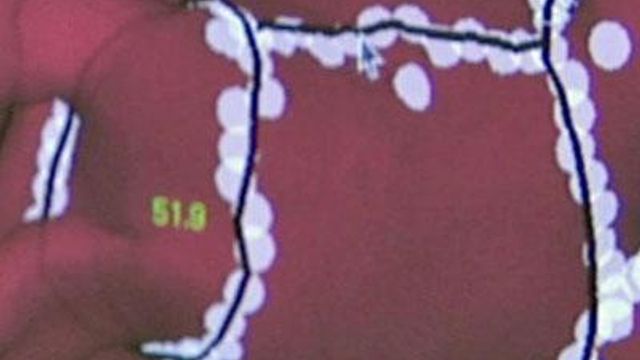Doctors: Cold heart might not be a bad thing
A cold heart might not be such a bad thing, according to doctors, because it can cure atrial fibrillation, or A-Fib.
Posted — UpdatedA-Fib is the most common heart arrhythmia disorder, and it dramatically increases the risk of stroke. A new treatment uses a freezing touch to restore normal rhythm.
About five years ago, Linda Roub's heart started having an irregular rhythm and then returned to normal. It became more frequent, and medications didn't help.
“It really tires you,” she said. “Going up a flight of stairs is torture.”
She had atrial fibrillation and came to Duke University Medical Center cardiologist Dr. Tristan Bahnson for help.
“During A-Fib, the upper chamber is activated in a chaotic fashion, and that results in a rapid heart rate and decrease in efficiency of the function of the heart,” Bahnson said.
One popular treatment is heat ablation, using a heated catheter tip to burn points inside the heart to stop faulty electrical signals that cause A-Fib. A year ago, the FDA approved a special catheter to apply a freezing burn with a cryoballoon.
“(It is) advanced up through the blood vessels to the heart and then advanced into the pulmonary vein, and then it can be made very cold,” Bahnson said. “The balloon aims to ablate, or freeze, tissue at the opening of each of those veins.”
With heat ablation, a tip burns several points at each of four vein openings. The cryoballoon freezes a larger area with one application, doing it faster and safer.
“It turns out that the cryoballoon seems to be somewhat less likely than radio frequency ablation to produce either narrowing of the pulmonary veins or injury to the esophagus,” Bahnson said.
Roub said she woke up from her cryoballoon treatment with a noticeable improvement.
“(I had) energy. I was awake in the day and tired at night, a normal cycle instead of being tired all the time,” she said. “I'm hopeful and optimistic it won't come back.”
The cryoballoon procedure is recommended for patients with occasional rather than constant atrial fibrillation and for those who don't respond to first line medication therapy.
• Credits
Copyright 2024 by Capitol Broadcasting Company. All rights reserved. This material may not be published, broadcast, rewritten or redistributed.





